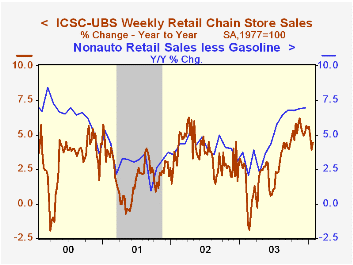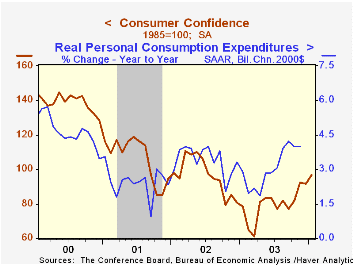 Global| Jan 27 2004
Global| Jan 27 2004Chain Store Sales Surged
by:Tom Moeller
|in:Economy in Brief
Summary
Chain store sales surged 1.1% last week according to the ICSC-UBS survey. The pop recouped all of the sales decline during the prior two weeks and was driven by clearance promotions and surging consumer sentiment. Sales in January [...]

Chain store sales surged 1.1% last week according to the ICSC-UBS survey. The pop recouped all of the sales decline during the prior two weeks and was driven by clearance promotions and surging consumer sentiment.
Sales in January with one full week remaining are up 1.8% versus last month.
During the last ten years there has been a 59% correlation between the year-to-year percent change in the ICSC-UBS measure of chain store sales and the change in non-auto retail sales less gasoline.
The ICSC-UBS retail chain-store sales index is constructed using the same-store sales reported by 78 stores of seven retailers: Dayton Hudson, Federated, Kmart, May, J.C. Penney, Sears and Wal-Mart.
| ICSC-UBS (SA, 1977=100) | 01/24/04 | 01/17/04 | Y/Y | 2003 | 2002 | 2001 |
|---|---|---|---|---|---|---|
| Total Weekly Retail Chain Store Sales | 430.9 | 426.4 | 4.4% | 2.9% | 3.6% | 2.1% |
by Tom Moeller January 27, 2004

The Conference Board’s Index of Consumer Confidence jumped to 96.8 in January, the highest level since July 2002.
The index of confidence for December was revised up but the 5.6% m/m rise in January fell slightly short of Consensus expectations for a reading of 97.0.
During the last ten years there has been a 61% correlation between the level of consumer confidence and the y/y % change in real PCE.
The rise in Confidence was only half the 11.5% jump in the preliminary January read of Consumer Sentiment reported by the University of Michigan.
The index of consumer expectations rose 4.6% m/m to 108.1, up 76.1% since the low in March 2003.
The reading of the present situation recouped nearly all of the prior month's drop and rose to 80.0, up 34.0% since the low in September 2003.
Jobs were viewed as hard to get by 31.4% of respondents, down slightly from 32.4% in December.
Expectations for business conditions in six months improved further, to the best level since late 1992.
The Conference Board’s survey isconducted by a mailed questionnaire to 5,000 households and about 3,500 typically respond.
| Conference Board | Jan | Dec | Y/Y | 2003 | 2002 | 2001 |
|---|---|---|---|---|---|---|
| Consumer Confidence | 96.8 | 91.7 | 13.1% | 79.5 | 96.6 | 106.6 |
Tom Moeller
AuthorMore in Author Profile »Prior to joining Haver Analytics in 2000, Mr. Moeller worked as the Economist at Chancellor Capital Management from 1985 to 1999. There, he developed comprehensive economic forecasts and interpreted economic data for equity and fixed income portfolio managers. Also at Chancellor, Mr. Moeller worked as an equity analyst and was responsible for researching and rating companies in the economically sensitive automobile and housing industries for investment in Chancellor’s equity portfolio. Prior to joining Chancellor, Mr. Moeller was an Economist at Citibank from 1979 to 1984. He also analyzed pricing behavior in the metals industry for the Council on Wage and Price Stability in Washington, D.C. In 1999, Mr. Moeller received the award for most accurate forecast from the Forecasters' Club of New York. From 1990 to 1992 he was President of the New York Association for Business Economists. Mr. Moeller earned an M.B.A. in Finance from Fordham University, where he graduated in 1987. He holds a Bachelor of Arts in Economics from George Washington University.
More Economy in Brief
 Global| Feb 05 2026
Global| Feb 05 2026Charts of the Week: Balanced Policy, Resilient Data and AI Narratives
by:Andrew Cates






